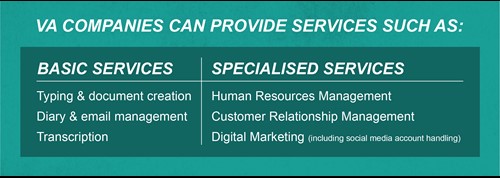Hiring the right virtual assistants for your business can be challenging, especially in today’s business climate. Not only do they have to be good on paper, and more than someone who just deals with the tasks you’re too busy to handle, they need to show intuition and ingenuity when approaching what many of us would view as mundane day-to-day tasks.
Furthermore, the conventional model of having just one dedicated assistant attending to your needs doesn’t always work since there are the obvious limitations to one human’s availability over the course of a year. From the occasional sick leave to national holidays, there are multiple instances in which personal assistants will elude you when you need them the most.
On that note, let’s examine the true cost of a traditional personal assistant arrangement to a business, and how much you can save each year by hiring virtual assistants:
The cost of a personal assistant
Amount paid on days off
A personal assistant’s salary in the UK ranges from £23,100 to £38,000, with a mid-point of £34,000. In London, salaries range from £29,800 to £49,000. Where industry-specific experience is required, these figures can be considerably higher.
However, a full-time worker in the UK has the right to at least 28 days off in a year, and with entitled additional days off due to illness, training days and other circumstances, statistics suggest that the average worker has 53 days of non-attendance annually. That’s 20% of the working year where businesses are paying for absent staff.
The cost of poor customer service
Businesses can still lose in other ways outside of days off. When customers or potential partners are left unattended to, they often try the competition. The same goes for scenarios where they are given ineffective or insufficient help, or are not given the relevant training and accreditation to complete the role to the required standard.
Another consideration is businesses where key staff are left to their own devices when it comes to admin support. Many businesses in recent times have reduced or removed PA support to some levels of management, leaving them to ‘self-serve’. The implications of this ‘strategy’ can be wide ranging but the general gist is that it doesn’t make sense to have your senior team members being distracted from their core jobs. Here’s a simple example:
Four senior managers all earning £100,000, and who previously shared one full time PA, have their support removed. What’s the potential cost impact?
By removing one £35,000 salary this business has caused four senior contributors to waste 10-20% of their own time on admin, potentially losing clients, damaging reputation, delivering poorer service, etc. Overall that £35,000 PA salary ‘saving’ is replaced by a cost more likely to be well in excess of £100,000.
The true cost of full-time salaries
It’s worth remembering that there’s money spent in the hiring process, including:
- IT recruitment software subscriptions
- Advertising positions
- Conducting interviews and tests
- On-boarding
- Orientation materials
- Training
- National insurance
- Pension contributions
Viewed together, the total or true cost of a £35,000 salary is often 65-80% greater in real terms.

How virtual assistants change the game
Flexibility in deployment
For starters, when you outsource personal assistants, the provider can emulate the conventional approach of having one dedicated PA, or they can ensure that you have personal assistance on demand – in other words the latter approach is more focused on the service required than the individual/s providing the service. The latter model implies that you don’t have to worry about your PA being absent and therefore unavailable. Professional admin-as-a-service providers will anticipate any gaps in service and make sure that someone else is brought up to speed and can serve as a temporary replacement.
Certain providers, like SmartPA, have taken this approach further and evolved a delivery model wherein their admin services are provided through what they refer to as the SmartPOD. Their experience in servicing clients around the world highlighted continuity of service as one of the key issues. Hence the creation of the SmartPOD which focuses on the service, not the person providing the service.
Essentially it means all their services are delivered through teams of at least 3 people but with one primary contact point (the client’s SmartPA). Everyone in the team knows the clients’ specific requirements and so if one team member is ill or off on training, there is no impact for the client. This also enables SmartPA to maximise efficiency as PODs are capable of supporting multiple clients in parallel.
The benefits to the customer are:
- Pay only for productive time attributed to their account
- No impact to service delivery
- No wasted time looking for substitutes
- No diverting internal staff away from their core jobs to pick up the slack
- And …. remember those 53 days per year per employee lost to general absenteeism? You get them all back!
Some businesses may also need PAs 24/7 depending on the nature of their business, especially those operating online and in different time zones. This could be a situation like supporting a geographically dispersed executive team, or even short-term support for an exec team travelling between continents. The larger and more established virtual PA companies can easily develop the optimal solution for rotating PAs such that 24/7 businesses always have administrative support and retain customers.
A further point worth consideration is scale and flexibility. Larger Admin-as-a-service providers are able to draw on global resource pools with wide skills and capabilities. As a result, these providers will offer flexible service solutions where resources and skills can be added and removed as required. This is often very effective when an enterprise needs to pull together a team for a tactical project. In these situations, time to market can be key and a virtual solutions provider is likely to be able to deliver a stand-up team in days as opposed to weeks and months.
Simplification of training and reskilling
The larger a business is or the more dynamic its dealings are, the more likely it is to need PAs with varying skill sets. They might need a mix of PAs who are proficient in spreadsheet tools, and those who are conversant with word processing, database management or cloud computing tools.
The business may also need some of its PAs to be fluent in foreign languages. Undoubtedly, putting together a team of PAs with variations in their skill sets can be quite tricky. Keep in mind that needs can also change over time and these PAs might have to go back to learning a new skill or language periodically.
Companies providing virtual administrative services are in a better position to analyse data from different sources and determine the demand for different PA skills in various industries and regions. They can also conduct forecasting to know which skills will be crucial for PAs to have in the near future.
As such, they relieve businesses of the burden of having to sort through long lists of candidates and continuously invest in broadening their skillsets. They can trust the administrative service provider to always have virtual assistants with the right breadth of skills available at the appropriate time.
Reduction in PA remuneration
The larger virtual PA firms can select PA candidates from a global pool of talent, meaning that the company will have access to a greater volume of resources and a much wider mix of skills and experience.
By building PA teams on a larger scale, the more established service providers can drive cost and operational efficiencies. Ultimately, they are in a position to pass on these economies to their customers, helping them to also realise cost savings. Whether a business is looking for one virtual assistant or a large outsourced team, a well-structured virtual assistant service package from professional provider will deliver considerable savings over the equivalent tasks being undertaken by full time employees.
Reduction in infrastructural costs and eco friendliness
Whether it’s a virtual receptionist or virtual secretary you need, a virtual administration services business is able to provide this help without much need for physical interfacing. Through any number of existing technologies, you can communicate and collaborate with your assistant in real-time from anywhere in the world.
They only have to be physically available in cases where you need them to tag along for highly-sensitive presentations and other on-the-ground exercises. This means that a business can save money on office space and supplies, along with other costs resulting from workers’ commutes. As a result, there is an added environmentally sound aspect to outsourcing. Given the pressures on large businesses to implement Corporate Social Responsibility strategies (CSR), of which environmental policy is an element, then this becomes another positive for considering outsourcing admin tasks.
Virtual assistants are more likely to be fully prepared to use various productivity tools and work from different spaces with minimal additional investment from the employer. Furthermore, transitioning full-time on-premises assistants into remote work comes with cultural shifts that may take some time getting used to.
Cross-border knowledge sharing
For companies that often conduct business in different countries, a virtual assistant company can be a very strategic ally beyond basic PA functions. Say you need to find out which distributors you can put in charge of your operations in another country, who are the best local legal consultants, and which government agents are the most appropriate to liaise with.
This information might be harder to get from an on-site PA in your own country. However, outsourcing PAs means you can get someone who knows the lay of the land very well. For instance, when scheduling a meeting with a potential partner in a foreign country, a virtual PA might be able to advise on the ideal places to meet and the best time of day to do it.
They may also tell you a bit about the different payment methods and retail banking options in that country, variations in telecommunications and internet technologies, local holidays unknown to outsiders, and plenty of other useful details. Ultimately, you’ll have an easier time penetrating new markets since you’re getting ideas from the right people.
In that regard, you could also end up spending less on research, and avoid unforeseen costs that come with not knowing how to transact in a foreign land.
Services commonly provided by virtual assistant firms

Virtual PA companies can provide basic services such as typing and document creation, diary and email management, and transcription. They can also provide specialised services in the realm of human resource management, customer relationship management, digital marketing (including social media account handling), and many more services.
They can also assign individuals or teams to answer calls, book appointments, take messages, handle overflow and analyse data. By extension, some of these firms offer training and research-related services since they often take on the role of getting PAs up to speed on new technologies and industry-practices, in addition to having vast knowledge on how to support international operations.
What to look for in a virtual assistant company
Versatility
It is always better to go with a firm that has access to a vast resource pool spanning a wide range of skills and languages. You don’t want to spend time sourcing a virtual assistant only to realise that you need to approach another company for the next set of skills you require. Managing multiple supplier relationships is inefficient, so it’s best to aim for a one-stop-shop approach.
The more services you can find under one company, the better. This provides you with a degree of future proofing knowing that your supplier has the scale and flexibility to deliver not just what you need now, but what you may require in the future.
Inclusivity
If a virtual PA firm is only sourcing candidates from one small region, they are more likely to think alike, talk alike and behave the same way. This means that you won’t get that many fresh ideas and if some of these people are performing customer-facing tasks, certain groups may feel underrepresented.
Try to find a company that gives a fair chance to women, people of different ethnicities, religious backgrounds and other social classifications.
Solutions & Differentiation
Different organisations go about their internal operations in their own specific way so it helps to go with a virtual PA company that will take the time to adjust to your organisation's unique needs. Some companies will provide bespoke arrangements where they tailor solutions specifically to the needs of each and every customer whether it be in supporting individuals, groups and taking on an entire administrative process.
Quality Control
One of the key reasons for favouring a professional virtual assistant provider over hiring a team of independent freelancers, for example, is quality control. The more established providers operate on referral, and protecting their reputation is key. Look for information on their training processes, the right suppliers to do business with will provide standardised training and they’ll have accreditation processes in place for all their delivery people.
Affordability
When looking for an affordable PA provider, it’s never just about looking at what they charge for a single PA and extrapolating. You should find out what it takes to upgrade a package, what’s included in it, and most importantly, whether you can agree to pay only for the services you used in a particular period.
The last thing you want to do is end up stuck with a bulky and expensive package that you’re under-utilising. Seek out companies that are willing to have a discussion with you and structure a favourable and sustainable agreement.
The future of the virtual assistant space
According to Intuit, more than 80% of companies want to use a more flexible workforce, and permanent remote workers were also expected to rise to 34.4% by the end of 2021. This mutual pursuit for greater flexibility on both the employer and employee side is also going to enhance the personal assistant space.
Companies that use virtual personal assistants can save up to 78% in operating costs while achieving a 13% increase in productivity. For professional help in outsourcing personal assistants and other administrative processes, you can contact the SmartPA team.

About SmartPA
SmartPA is the pioneer of remote, admin-as-a-service BPO provision. We have in excess of 3000 customers world-wide. We deliver our services by drawing on the most appropriate skills and talent from within our internal CoE (Centre of Excellence) teams and our global network of over 350 fully trained and accredited franchise partners. Our CoE base is in the UK, we have a near shore hub in South Africa, and an offshore hub in Malaysia enabling us to support our clients where and when they need.
From the provision of individuals, to multi-skilled cross-functional teams, to full lift and drop admin process outsourcing, SmartPA has the skills, experience and processes to tailor the perfect solution for businesses of all sizes.
